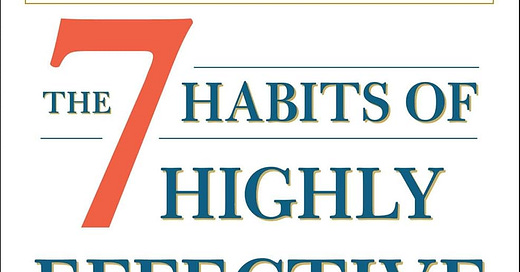Mastering Money with The Seven Habits
Applying Covey’s Proven Strategies to Achieve Financial Success and Independence
Stephen R. Covey’s The Seven Habits of Highly Effective People is more than just a self-help book—it’s a blueprint for personal and financial transformation. With a focus on character ethics and timeless principles, Covey presents a structured approach to effectiveness that has resonated with millions worldwide. The book advocates an “Inside-Out” approach to success, emphasizing internal character development as the foundation for external achievements, including financial well-being. Unlike quick-fix solutions, these habits offer a structured framework for financial discipline, wealth-building, and long-term stability, emphasizing personal responsibility, integrity, and interdependence.
What Makes It Different
What sets The Seven Habits apart from other self-improvement books is its focus on character rather than personality. Covey contrasts the “Personality Ethic” (short-term techniques) with the “Character Ethic” (fundamental principles), making a compelling case for long-term, sustainable financial success. His integration of psychological insights with real-world applications creates a powerful, practical guide that remains relevant decades after its original publication, particularly for those striving for financial independence and security.
Key Takeaways from the Seven Habits for Financial Success
Be Proactive: Take control of your financial destiny. Instead of reacting to financial difficulties, proactively create a budget, build an emergency fund, and plan for future financial goals.
Begin with the End in Mind: Define your financial vision. Whether it’s early retirement, debt freedom, or financial independence, having a clear financial goal will guide your daily decisions and spending habits.
Put First Things First: Prioritize financial security by focusing on essential investments and savings before indulging in discretionary spending. Apply Covey’s Time Management Matrix to financial planning by avoiding impulse purchases and prioritizing wealth-building activities.
Think Win-Win: Adopt an abundance mindset in financial dealings. Negotiate fair contracts, invest in mutually beneficial ventures, and build wealth through ethical, sustainable means rather than seeking shortcuts.
Seek First to Understand, Then to Be Understood: Develop financial literacy. Educate yourself on investing, budgeting, and personal finance before making major decisions. Listen to experts and seek mentorship rather than making uninformed choices.
Synergize: Collaborate with financial advisors, partners, and like-minded individuals to maximize wealth creation. Leveraging different perspectives can lead to smarter investment strategies and innovative financial solutions.
Sharpen the Saw: Continuously educate yourself on personal finance. Read books, take courses, and stay updated on financial trends to ensure long-term financial stability and growth.
Who Should Read This Book?
This book is ideal for professionals, entrepreneurs, and anyone looking to improve financial habits and achieve financial independence. It’s particularly valuable for those seeking long-term financial security and a principled approach to wealth management. The Seven Habits of Highly Effective People is a masterclass in personal and financial development. Covey’s principles transcend trends, providing a timeless roadmap to financial success. Whether you’re new to personal finance or an experienced investor, this book offers invaluable insights. With a rating of 9/10, this book is an essential read for anyone dedicated to achieving financial freedom and long-term wealth-building through disciplined habits and principled decision-making.
Disclaimer: The information provided is not intended to replace professional financial advice tailored to your unique situation. Despite our best efforts to ensure the accuracy and timeliness of the information presented here, we make no express or implied representations or warranties about its completeness, accuracy, reliability, suitability, or availability. Any reliance you place on such information is solely at your own risk. Please be advised that the content herein is not financial advice. It is highly recommended that you seek personalized financial advice from a professional.



